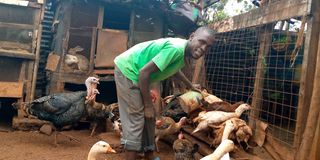How I turned Sh300 political rally handout into Sh1,000 daily income

Peter Njoroge feeding his poultry at Kianjiru-ini village in Murang'a County. He says the business whose initial capital was Sh300 gives him Sh1,000 per day.
When Peter Njoroge scored 140 marks out of the possible 500 in the 2007 KCPE, he was pleased with himself.
“It was a good try because I was in position 38 in a class of 42. I had competed against physically well students and with my congenital joint condition managed to beat nearly half of them. I looked forward to joining a hairdressing course,” he says.
But that dream was made impossible by lack of school fees to finance the course.
“I have always convinced myself that my disability does not in any way limit me from living an ordinary life … In fact, despite much mocking in society as I grew up, I always refused to make it a big issue and always appreciated myself the way I was born,” he said.
It is in that self-belief and daring that he decided to relocate from his home in Kianjiru-ini village to Ruiru, where he had a relative.
“I did not go there as a tourist. By the second week, I was already at a construction site, where I would be assigned lighter duties. While I could not ferry building materials, at least I could serve the masons with water as well as wash the tools after working hours were over,” he said.
He would be paid half the rate and he used the money to rent his own house.

Peter Njoroge hawks his stuff in Maragua town, Murang'a County. Disability did not prevent him from working and fetching Sh1,000 a day.
“I was envisaging full independence … earn, save and find a family. It was not long before I learnt the hard way that footing bills meant more than having a dream. I learnt that bills were paid out of work and pay,” he said.
By 2010, he had surrendered and travelled back to his village.
“In my condition and non-skilled state, not many were willing to give me a job, especially because I was still underage. I came to realise that the law frowned on anyone giving me a job as it amounted to child labour … I went back home considering myself very lucky to have survived in a town for three years,” he said.
Back home, he refused to be a burden on the society “even when some people advised me to be showing up in Maragua and Muthithi towns to beg”.
He started seeking casual jobs to earn money for food in the village. He would be recruited for chores like babysitting, feeding poultry and running errands.
“The only thing that was proving problematic was to get a girl to love me. My disability was repelling lovers from my way.”
By 2013, when he was 20, he decided that love was not something that would come easily.
“Even today, when I am 30, girls have been keeping off me,” he mused. But he added that when he has some cash to spend, he is never short of female company to help him exhaust it “but I have now become a master of saying no to such relationships”.
He remembered that on May 8, 2017 a politician gave him Sh300 when he bumped into him on the campaign trail.
“I had always wanted to start a business ever since I relocated from Ruiru … I don’t know why this Sh300 appeared special to me … perhaps it was the urge to be as successful as that politician,” he said.

Peter Njoroge at the commercial Vision Farmers Challenged Group's Hass Avocado seedlings grafting nursery at Kianjiru-ini village in Murang'a County.
On the morning of May 9, he went with the Sh300 to a farmer who grew sugarcane for sale.
“I bought sixty pieces at Sh5 each … I sold them off at Sh10 each and I made Sh300 more as profit,” he said.
“I pumped the cash back into the venture and for two years, I had saved Sh12,000. I used the cash to venture into hawking, where I bought a tray and assorted merchandise that included sweets, cashew and groundnuts, biscuits and chewing gums,” he said.
Mr Njoroge said hawking became his turning point because it helped him invest in poultry farming. “I keep ducks, turkeys, geese, chickens and rabbits … I sell … chicks and mature birds,” he said.
“The Sh300 from the politician is what I today consider to be my mustard seed that has grown day by day to a point that I have grown to earning not less than Sh1,000 per day.”
He also sells Hass avocado seedlings that he grafts under the sponsorship of Kenya Plant Health Inspectorate Service (Kephis). He has a self-help group that sells them at low prices because the programme is subsidised by donors.
He revealed that for the past six months he has been dating and will soon be announcing good news about “a queen who has come to love me and I love her”.
“Certainly, we are planning how to come together and build a home.”





